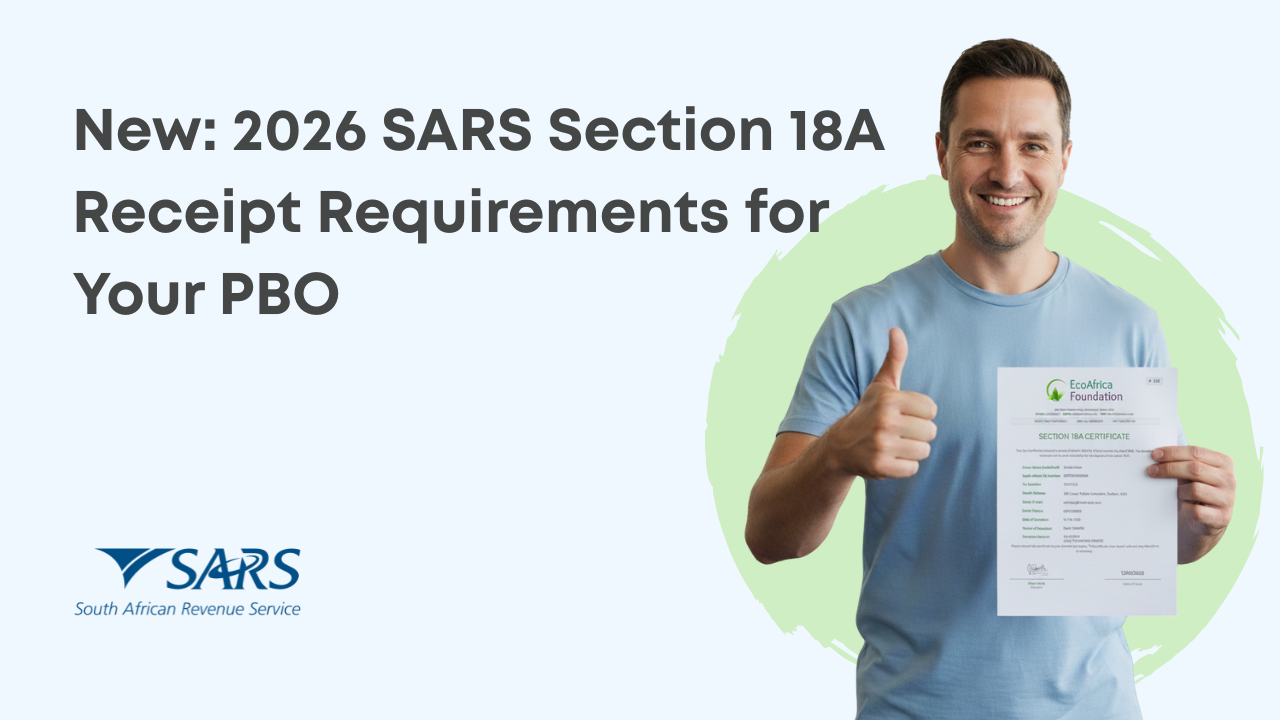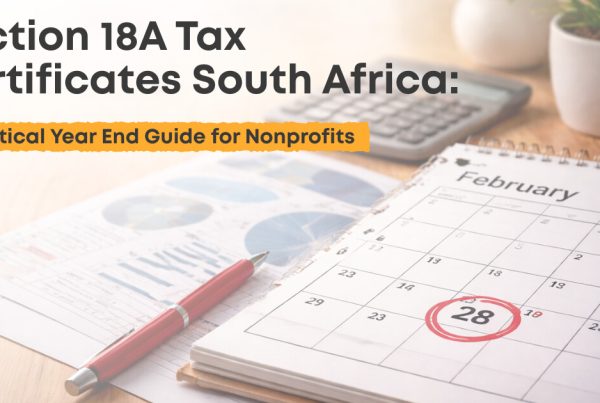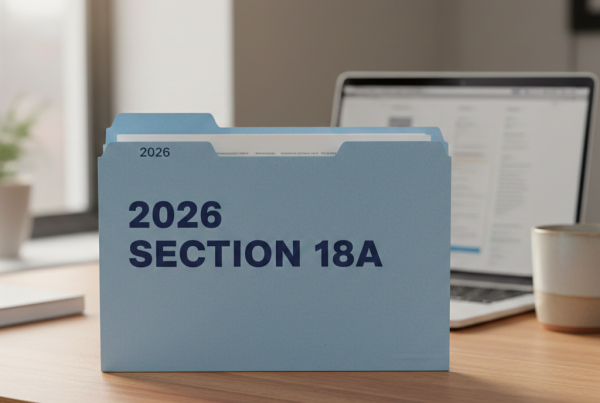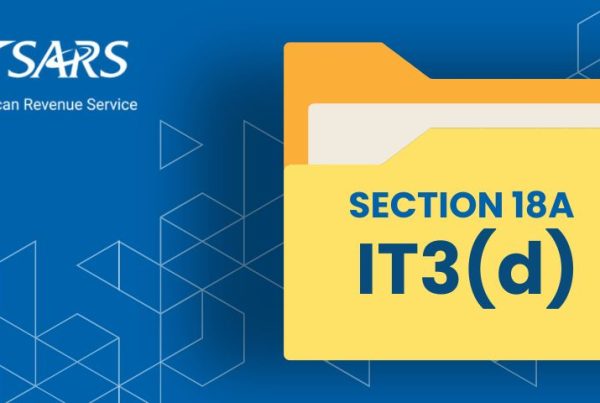
The South African Revenue Service (SARS) has announced significant updates to the Section 18A receipt regulations, set to take effect on 1 March 2026. These new requirements replace the previously communicated 2023 rules and introduce stricter criteria for issuing valid tax certificates.
For Public Benefit Organisations (PBOs), understanding these changes is critical to maintaining compliance, ensuring your donors can claim their tax deduction, and avoiding penalties. This article is your essential guide to the upcoming changes, breaking down what they mean for your organisation and how you can adapt seamlessly.
New 2026 SARS Section 18A Tax Certificate Regulations
On 24 October 2025, the South African Government Gazette #53589 announced updated requirements for issuing a valid Section 18A certificate, to be enforced starting 1 March 2026. This announcement supersedes the draft rules initially shared for 2023. The changes are designed to enhance the detail and traceability of every donation that receives a tax certificate, and include several key mandates:
- Expanded Donor Information: Capturing the donor’s nature (individual, company, trust), ID/registration number, and tax reference number.
- Stricter In-Kind Donation Records: Requiring detailed descriptions and market values for all donations in kind.
- Unique Receipt Numbering: Every Section 18A receipt issued must have a unique identifying number.
- Formalised Process: The issuance of tax deductible receipts is now more formalised, making manual processes a significant compliance risk.
This move creates a more transparent and auditable trail for all donations made to approved organisations. For any PBO with Section 18A approval, adapting to these changes is no longer optional but essential for operational continuity.
SARS 2026 Rules vs 2023 Requirements Explained:
The most notable changes in the 2026 requirements expand upon the donor information that must be captured on the Section 18A tax certificate. Previously, basic details were sufficient. Now, organisations must record the donor’s full name, the nature of the donor (e.g., individual, company, or trust), and crucially, their identity number (for individuals) or registration number (for businesses). Furthermore, the tax reference number of the donor must be included to facilitate easier donor verification by SARS.
Additional Requirements for Goods in Kind Donations
Another critical update involves donations in kind (in-specie donations). The new Section 18A rules require a detailed description of the property donated, and the fair market value. Every receipt issued must also feature a unique receipt number. These enhanced new requirements make it imperative for PBOs to have robust systems in place to capture and store this data accurately for every single goods in kind donation they receive.
Why is SARS Implementing Stricter Section 18A Controls?
The primary rationale behind SARS’s action is to increase accountability across the non profit sector and curb fraudulent claims. By making the Section 18A certificate more detailed, SARS can efficiently verify that the donation was indeed a bona fide donation actually paid and that the donor is legitimate. This directly supports their goal of reducing incorrect tax deduction claims on the donor’s annual income tax return.
These changes also align with SARS’s broader digitalization strategy and the implementation of 3rd-party reporting. When a PBO issues a Section 18A tax receipt, it is not just a piece of paper for the donor; it is a data point that SARS will eventually match against the donor’s filed return. Ensuring compliance with the requirements is no longer just about helping a donor claim a tax deduction; it is about being a responsible reporter in the national tax ecosystem.
What is the Impact of These Changes to Your PBO?
For many NPOs, these updated regulations will increase the admin burden quite significantly. Manually tracking donor information – from their ID number (or Company/Trust registration numbers for entities) to their tax reference number is time-consuming and often error prone. The additional requirements for donations in kind add another layer of complexity, requiring valuations and detailed descriptions that many organisations may not have systematically recorded before.
Loss of Donor Confidence + Associated Penalties
The risks of non-compliance are substantial. If a Section 18A receipt issued by your organisation does not meet the new requirements, SARS can disallow the donor’s deduction from taxable income. This can severely damage donor relationships and your organisation’s reputation. Non-compliance could even lead to penalties from SARS and/or jeopardize your PBO’s valuable Section 18A status. Therefore, ensuring compliance is paramount for operational continuity and donor trust.
How Can Your PBO Simplify Section 18A Management?
ActiveDonor provides a dedicated Section 18A management platform designed to eliminate the administrative headache of the new regulations. Our system is built to help your tax exempt institution capture every required data field for each donor, ensuring that no critical information is missed when a donation is received. This includes all the new mandatory fields such as the nature of the donor, ID details, and tax reference number.
With ActiveDonor, generating a fully compliant Section 18A tax certificate is instantaneous. The platform automatically populates all required information, assigns a unique reference number, and creates a secure digital record of every receipt issued. This not only saves your team countless hours but also provides a reliable audit trail, giving you peace of mind that your organisation is meeting all requirements set by SARS. You can issue Section 18A receipts with confidence, knowing they are always valid.
Explore our dedicated Section 18A Tax Certificate solution to see how it works.
How Does ActiveDonor Streamline Your IT3D Submissions to SARS?
Beyond individual S18A receipts, SARS requires PBOs to submit an annual declaration of all Section 18A certificates issued during the year of assessment via a bi-annual IT3(d) submission in May and Oct. ActiveDonor seamlessly prepares your organisation for this obligation by automatically consolidating all your donor and receipt data throughout the year.
When it’s time to file, ActiveDonor pulls complete and accurate data for your IT3D return, generates your SARS compliant IT3(d) file and submits it to SARS in 1-click ensuring full regulatory compliance. This eliminates the need for manual spreadsheets and data compilation, which is not only tedious but also a common source of errors. The platform handles the entire process, from data validation to file generation, making what was once a complex and stressful task straightforward.
By using ActiveDonor, you ensure that your reporting to SARS is precise, timely, and fully aligned with the terms of Section 18A, making your annual reconciliation a smooth process.
Learn more about our automated IT3(d) submission service.
Key Takeaways: Summary of the 2026 Section 18A Requirements
- Effective Date: 1 March 2026, applying to ALL S18A receipts issued on or after that date.
- Donor Details: Approved organisations must capture significantly more donor information, including tax reference numbers and registration details.
- In-Kind Donations: Donations in kind require detailed descriptions and valuation amounts stipulated on receipts.
- Unique Numbering: Every Section 18A receipt must have a unique receipt number for tracking.
- SARS’s Goal: Enhanced transparency, reduced fraud, and improved donor verification for tax deduction claims.
- Non-Compliance Risks: Disallowed donor deductions and potential penalties for your PBO.
Where Can You Find Free Resources for Section 18A Compliance?
To help your public benefit organisation navigate this transition, ActiveDonor has compiled a number of free resources designed for practical use for PBOs:
- Updated Section 18A Compliance Handbook: Our comprehensive guide has been refreshed to reflect the latest 2026 rules, providing an invaluable deep dive for any non-profit organisation.
- Free Sample 2026 Certificate Template: Download our new, sample Section 18A certificate template designed to meet the 2026 specifications. Use it to audit your current processes or as a guide for your receipts.
- Experience ActiveDonor Firsthand: Ready to see how easy compliance can be? Start your free trial or book a personalized demo to see how ActiveDonor automates the entire process for your PBO.
These resources are part of our commitment to supporting the sector in maintaining compliance and focusing on its core public benefit activities.
Ensure your organisation is ahead of the curve. Explore how ActiveDonor can secure your Section 18A compliance today.






